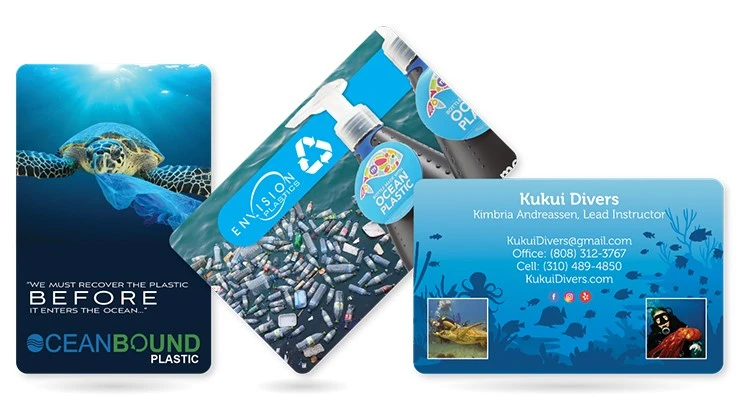
A North Carolina-based plastics recycler is teaming up with a plastic film supplier and printer to make business cards from recycled plastic.
Envision Plastics, headquartered in Reidsville, North Carolina, collects and recycles plastic scrap, including post-consumer high-density polyethylene (HDPE), into resin pellets to produce new bottles and containers. Through its OceanBound Plastic program, the company aims to recover 10 million pounds of at-risk plastic and seeks to find partners to make products from its OceanBound plastic resin line.
In a new project, Envision Plastics collects and recycles plastic scrap, a Virginia-based facility processes the material into sheets and Plastic Printers, a Hastings, Minnesota-based company that prints plastic business cards, will produce business cards made out of the at-risk ocean plastic.
One of the biggest challenges in the OceanBound Plastic program is getting packaging companies to commit to using the recycled resin pellets.
“A key to ensuring financial stability around the effort will be getting big consumer packaged goods companies to commit to buying OceanBound resin,” says Envision Plastic Vice President Tamsin Ettefagh. “Otherwise, Envision may have to reduce its purchases of material.”
“In order to make collecting what we define as OceanBound Plastic waste sustainable, Envision and the places we collect the scrap from need customers willing to make longer commitments than many of one-off purchases we have seen,” she says.
To create the resin line, Envision says it collects at-risk plastic from some of the top countries contributing to the plastic ocean crisis, including Indonesia, the Philippines and Sri Lanka. From June 2017 to May 2018, Envision recycled 5.2 million pounds of plastic recovered from coastal areas of Mexico’s Yucatan Peninsula, Haiti and the Dominican Republic.
Ettefagh says the company plans to collect the same amount in 2019 to meet its current goal of recovering 10 million pounds from the oceans.
With the project, Envision says it pays competitive prices, so foreign suppliers can create jobs instead of relying on volunteers, and generates bales with specifications roughly equivalent to domestic curbside bales.
“Plastic Printers is beyond excited and so grateful to have the opportunity to impact our environment and planet by helping find ways to repurpose OceanBound Plastic,” says Plastics Printers director of marketing Katie Buss.
The Society of Naval Architects and Marine Engineers (SNAME), an international nonprofit serving the maritime and offshore industries and their suppliers, was among the first to support the new business cards.
“At my former position in the plastics industry, we had our business cards created from recycled Mountain Dew bottles,” says SNAME Executive Director Gene Sanders. “Everywhere we went, our cards generated a very positive reaction from our customers, members of the media and with those whom we met on Capitol Hill.”
“Without the oceans, seas and waterways, we have no maritime industry, so our commitment to the ocean eco-system should be greater than anyone else’s. I am proud that we are leaders in this area, and we need more companies and organizations to follow our lead,” Sanders adds.
Latest from Recycling Today
- Orion ramping up Rocky Mountain Steel rail line
- Proposed bill would provide ‘regulatory clarity’ for chemical recycling
- Alberta Ag-Plastic pilot program continues, expands with renewed funding
- ReMA urges open intra-North American scrap trade
- Axium awarded by regional organization
- Update: China to introduce steel export quotas
- Thyssenkrupp idles capacity in Europe
- Phoenix Technologies closes Ohio rPET facility





